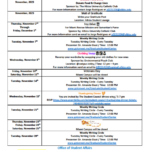On Friday, March 23, 2018, Albizu University hosted its 3rd Annual South Florida Research Symposium. Over 29 posters were submitted and accepted for presentation. Students from all levels of study (bachelor’s, master’s, and doctoral) presented their research findings outside of the Multipurpose Room, talking and networking with fellow students, faculty members, and staff.
But what is a research conference?
A research conference is an opportunity for professionals and students to present research findings to gain experience in the field, receive invaluable input from colleagues about how to strengthen their work, and disseminate exciting and cutting-edge findings from their field of study.
Why should I submit to research conferences?
So many reasons! But here are our top 3:
- It’s a great way to get seen. Maybe you’re looking to build up a closer mentor-mentee relationship with a professor, or maybe you’re looking to network with top leaders in your field. Either way, a research conference is an excellent way to get involved, get your name out there, and build up a reputation for yourself.
- It adds to your research experience. In psychology, everyone is trained in understanding, reading, and digesting research, even if it’s not a primary focus of their education. Being able to think critically about the things you’re reading, and make sense of them, has tangible effects.
- Graduate schools, internships, and postdocs love it. Presenting at a conference looks great to a prospective academic program or clinical placement. It shows that you’re active and dedicated to the practice of your field.
Okay, I’m sold. But how do I actually get involved?
Awesome! Here are the steps needed to get yourself to presenter-status:
- Get involved now. Find a professor with whom you think your research interests match well. Your interests don’t need to match exactly, but should be in a relatively similar field (for example, if you’re interested in clinical psychology, stay with a psychology faculty member).
- Weigh out the pros/cons of doing your own research versus linking up with a faculty members’ established research lab. Being a student means igniting your passion for what interests you, but it may not always be feasible from a cost and time perspective. You may find yourself really excited about studying the EKG patterns in individuals with schizophrenia…but…gaining access to that population, the instruments needed to study it, and the resources to effectively make sense of your results may make that a challenge. Instead, you may elect to study an archival database, or a dataset that your professor is currently collecting.
- Start researching the research! Once you and your professor establish a topic and figure out a course of action, start your literature review. Not sure where to start for that? We’ve got you covered here.
- Know your end game. Unlike a traditional course where you may have to write a paper, a poster is essentially a shortened and to-the-point version of a research paper. It involves a 36” x 48” poster that summarizes the literature you reviewed, the methodology used, analyses and results, and primary conclusions reached from the data. Read more about designing a poster here.










Comments are closed.